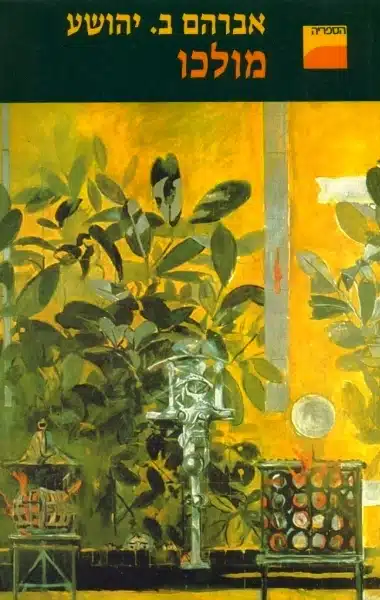Please scroll down for an English review.
הרומן "מולכו" מציג גבר ירושלמי אלמן בן ארבעים ומשהו, שמתהלך בעולם בתחושת תלישות ובלבול. הוא שותף למחצה למציאות סביבו, כאילו שבוי באשליה שהוא בדרך לאיזשהו יעד – אך לא ברור אם הוא עצמו יודע מה הוא מחפש. הסיפור מתרחש בשנת האבלות הראשונה לאחר מותה של אשתו, ומלווה אותו כשהוא מנסה לפלס לעצמו דרך מחודשת בעולם: עבודה, מסע, חיפוש רומנטי, ובעיקר בלבול מתמשך.
העלילה נעה בין ארבע עונות השנה, ומתחילה בראשית הסתיו, שבו אשתו נפטרה. לאורך השנה ומחזור העונות, מולכו מנסה לשקם את חייו, והוא נע בין התמודדות עם נוכחותה הדומיננטית־הנעדרת של אשתו המנוחה , שנדמה שעדיין מרחפת בביתם, במיוחד בחדר השינה , לבין הצורך הכמעט נואש שלו לזוגיות חדשה ומיטיבה.
א.ב. יהושע מציג גיבור ירושלמי ממוצא ספרדי־מזרחי, ובוחן דרכו את המתח שבין זהות מסורתית למודרניות חילונית, בין אבל אישי לבין שייכות תרבותית. מולכו אינו מתמודד באופן חד־משמעי עם האובדן , הוא שוקע בו. הוא מעוצב על ידי חוויית האבל, אך האירועים שהוא חווה אינם מוליכים להתמודדות ממשית עם האובדן הקשה. הקונפליקט שלו איננו דרמטי או מובהק: זהו גבר אובד דרך, שתקוע בין העבר להווה, בין מה שהיה למה שאולי לעולם לא יהיה.
הסיפור נמסר לקורא דרך תודעתו ההיסטרית והפאסיבית של מולכו. הדמות שלו מצטיינת באפרוריות, פסיביות ובמחשבות טורדניות שלא מרפות ממנה. במהלך שנת האבלות הוא אינו מצליח ליצור קשר זוגי מייטיב עם אף אחת מהנשים שסביבו. נדמה שהוא מחפש איזון , בין פחד לכמיהה, בין כאב לתקווה , אך נותר תקוע ברגש לא פתור. דמותו השבורה רגשית, שאמורה להיות לב הרומן, הפכה עבורי למעיקה מדי, כמעט חונקת בתחושת הדיכאון שהיא מעבירה.
הספר כתוב בסגנון הידוע של א.ב. יהושע: מדוד, לעיתים ריאליסטי ואף ביורוקרטי־יבשושי, והוא אינו מבקש לעורר חמלה כלפי הדמות הראשית , אלא להעמיד אותה עירומה, אולי אפילו נלעגת, בפני עצמה. כל זה יצר אצלי תחושת ריחוק שהקצינה בגלל עיצוב הדמות של מולכו. קשה להתחבר באמת לדמות כמו מולכו, שמצטיירת כרפלקסיבית, תלותית, ולעיתים קרובות כפאסיבית. הוא נע בין נשים, משקר בלי קושי, ושוקע בתוך עצמו , מבלי להעניק לקורא סיבה של ממש לרצות בטובתו.
בסופו של דבר, זהו רומן שמבקש לעסוק בשאלות של זהות, שורשים ואבל , אך מתקשה לעורר הד אמיתי. למרות שהוא כתוב ברמה טכנית גבוהה מאוד וכולל ניתוחים עוצמתיים של נפש ואובדן, חסר בו העומק האנושי והחום שיאפשרו לקורא להרגיש. גם חסר לי רגע המהפך , הרגע שבו הדמות מתעוררת על חייה ולוקחת עליהם אחריות, למרות הכאב. אומנם יש בספר תיאורים יפים, רגעים של שקט פיוטי ותחושת ירושלים מוכרת , אך התחושה הכללית היא של סיפור שמסתובב סביב עצמו, כמו מולכו, ולא באמת מתפתח. בינוני, לא בגלל שהכתיבה גרועה – אלא כי הוא לא הצליח להצית בי רגש אמיתי כלפי גיבורו.
מולכו/ אברהם ב. יהושע
הוצאת הספריה החדשה, 2008, 346 עמ'
דירוג SIVI –
איכות אודיו –

“Five Seasons” introduces a middle-aged widower from Jerusalem who drifts through life with a sense of detachment and confusion. He is only half-present in the world around him, as if caught in the illusion that he is heading somewhere, though it’s unclear whether he even knows what he’s seeking. The story unfolds over the first year of mourning following his wife’s death, as he attempts to forge a new path through work, travel, romantic pursuits, and, mostly, prolonged disorientation.
The plot is structured around the four seasons, beginning in early autumn—the time of his wife’s death. As the year progresses, Molkho struggles to rebuild his life, oscillating between confronting the dominant-absent presence of his late wife—who seems to linger in their home, especially in their bedroom—and his nearly desperate longing for a new, meaningful relationship.
A.B. Yehoshua presents a Sephardi-Mizrahi protagonist from Jerusalem and uses him to explore tensions between tradition and secular modernity, between private grief and cultural belonging. Molkho doesn’t decisively confront his loss—he sinks into it. His life is shaped by mourning, yet the events he experiences don’t push him toward any real reckoning with that loss. His conflict isn’t dramatic or sharply defined: he is adrift, trapped between past and present, between what was and what may never be.
The story is told entirely through Molkho’s anxious, passive consciousness. He is characterized by grayness, inertia, and obsessive thoughts that never quite let go. Throughout the mourning year, he fails to form a healthy romantic connection with any woman around him. He seems to be seeking balance between fear and yearning, pain and hope—yet remains stuck in unresolved emotion. His emotional brokenness, which should be the heart of the novel, became stifling for me, almost suffocating in its depressive weight.
Yehoshua’s style is precise, at times realistic, and even bureaucratically dry. There is little to no attempt to evoke sympathy for Molkho; instead, he is laid bare—perhaps even ridiculed—before himself. This created a sense of emotional distance that was only amplified by the way the character was shaped. It is difficult to connect to someone like Molkho, who comes across as self-absorbed, dependent, and often paralyzed. He drifts between women, lies with ease, and sinks into himself, without giving the reader a compelling reason to care.
Ultimately, this is a novel that aspires to deal with questions of identity, roots, and mourning, but struggles to resonate. Though technically well-written and full of psychological insight, it lacks the human warmth and emotional depth that would make a reader feel. I also missed a turning point—a moment when Molkho wakes up to his life and chooses to reclaim it, despite the pain. There are beautiful passages, quiet poetic moments, and a strong sense of Jerusalem throughout—but the overall impression is of a story circling itself, like Molkho, without truly moving forward. A middling novel—not because the writing is poor, but because it failed to stir any real empathy in me toward its hero.
לגלות עוד מהאתר Sivi's Books
Subscribe to get the latest posts sent to your email.


אלמן בן חמישים